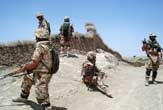Sleep Suffers in the Combat Zone

Getting a good night's sleep is much more difficult for military personnel who deployed to Iraq and Afghanistan, according to a new study of sleep patterns in the military. The scientific research confirms what plenty of soldiers, Marines and other members of the U.S. military have already experienced firsthand.
Military personnel were 28 percent more likely to report having trouble falling asleep or staying asleep during deployment, when compared with those who had not yet deployed. They were also 21 percent more likely to report sleep troubles after deployment.
"This is the first large-scale, population-based study of sleep patterns in the military," said Amber Seelig, data analyst for the Department of Deployment Health Research at the Naval Health Research Center in San Diego, Calif. "The primary finding of this study is that deployment does appear to affect sleep patterns in our population."
Survey respondents were more than twice as likely to report sleep problems if they showed symptoms of mental health problems such posttraumatic stress disorder or depression, or if they rated themselves as having fair or poor general health.
But the differences between the non-deployed group and the deployed and post-deployment groups faded when researchers adjusted for mental health conditions and combat exposure.
That came as no surprise for the researchers, given that mental health conditions frequently make for poor sleep. They speculated that boosting the quality and quantity of sleep during and after deployment could possibly protect against mental health problems in the military.
The study included 41,225 personnel on military rosters who filled out a baseline survey between 2001 and 2003, as well as a follow-up survey between 2004 and 2006. It encompassed all service branches of the U.S. military, including both active duty and Reserve/National Guard personnel.
Sign up for the Live Science daily newsletter now
Get the world’s most fascinating discoveries delivered straight to your inbox.
Trouble sleeping was reported by 25 percent of the non-deployed group, 27 percent of the post-deployment group, and 30.5 percent of the deployment group. But almost all groups reported short average sleep times of just 6.5 hours.
Researchers also found that moms of young children or pregnant women in all three study groups shared even shorter average sleep times – less than six hours. They warned that military moms may suffer enhanced stress from pregnancy and motherhood when facing the possibility of deployment.
"We were surprised to see how little sleep pregnant and postpartum women were getting," Seelig said. "Even when we looked at other literature, it seems that the women in our study were reporting much shorter sleep than civilian pregnant women."
This lack of sleep may affect military personnel performance in the long term, researchers warn. That goes hand-in-hand with past research that suggests people can accumulate a sleep debt, which cannot be undone by a few extra snatches of sleep here and there.
The research is detailed in the Dec. 1 issue of the journal Sleep.
- Traumatized Vets Face Higher Dementia Risk
- Top 10 Controversial Psychiatric Disorders
- Top 10 Spooky Sleep Disorders
